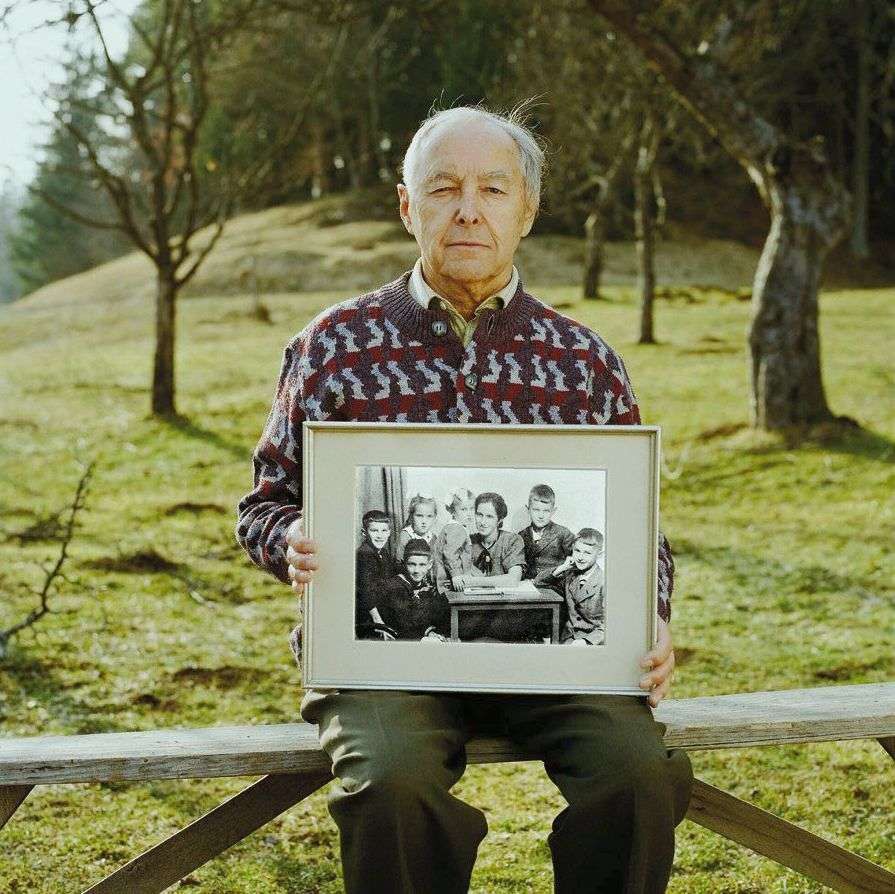Ferdinand Hafner
… and so I kept quiet when I was questioned
Ferdinand Hafner, a member of the Slovene minority in Carinthia, was born on 5th December 1932 and had five siblings.
His mother and his uncle were active in the OF, the "Osvobodilna Fronta" [1], which meant that the partisans were frequent visitors to the home of Mr. Hafner's family. From time to time, Mr. Hafner was also used as a messenger. Therefore the family was constantly observed by the Gestapo. For Ferdinand Hafner, the National Socialist era was a time of constant fear. He had to watch as his uncle was shot and his mother arrested. He was deeply traumatized by these events.
I grew up in a large family, with my parents – my father, born in 1901 and my mother, born in 1908 – five younger siblings, the youngest born in 1940; my grandmother, born in 1880, and my mother's brother, born in 1912. We lived in the small village of Sinach, consisting of six small houses, situated on a hillock above Feistritz in Rosental and surrounded by woods. At that time, the village was only accessible by a cart track. There was no electricity; for light we used gas lamps. We had a little farmhouse with three or four cows, calves, pigs and chickens.
Our family was well-known for belonging to the Slovene population and therefore we were persecuted by the National Socialist regime. When the local resistance movement started to become organized, my mother and my uncle became members of the Slovene Liberation Front. My mother worked in military service [as a courier]; my uncle was secretary of the local group Matschach. I remember, I also used to be allowed to go to Klagenfurt to take messages to certain people. The partisans were frequent visitors to our house and they received food and aid.
For me, the Nazi era meant living in a state of constant fear, caused, above all, by school. There I was beaten with the cane for every minor offense – on my back, the palms of my hands and my fingers, and if I moved my hand away, I was hit on the head. I often had to kneel down in front of the blackboard before the lesson if my school colleagues had told the teacher that I had spoken Slovenian. I especially feared the head teacher K., who was a fanatical National Socialist. He often locked me in the classroom after class and then he tried to make me tell him about what was happening at home, if I had seen partisans, what people were saying at home and so on. And because he didn't receive a satisfactory answer, I was beaten and slapped in the face. My mother repeatedly impressed on me the importance of not saying anything, so when I was questioned, I kept my mouth shut. This fear of speaking followed me for the rest of my life, and often manifested itself in exams at school – I had great difficulties there – and in my private life too.
Then, in May 1944, I lived through the terrible event that was the death of my uncle. He was betrayed to be a member of the OF resistance movement and shot by a man from the Gestapo on the way from Feistritz to Matschach. This was soon followed by the indescribable shock of my mother's arrest: in the early hours of the morning, an SS unit surrounded our house and mother had to open the front door. We children were all awake and had to watch as an SS man threatened our mother, holding a locked and loaded pistol to her chest. We all thought he was about to shoot her. Then they searched our house. Grandmother was lying sick in bed, as she had suffered a terrible shock upon the death of our uncle. I had to watch as an SS man pulled her out of bed with all her sheets and left her lying whimpering on the floor. Mother was being interrogated loudly in the back room. For us children, the fear was indescribable as we were continuously pushed around. Then mother was arrested, and we children had to watch as she was taken away, her eyes filled with tears. Beforehand, she had asked us to do as our grandmother told us, as father had been in the German Armed Forces since 1942.
Mother was locked up in a prison in Klagenfurt until the fall of 1944. Until the end of the war, we lived in terrible fear of being resettled.
First publication of this article in: Renate S. Meissner on behalf of the National Fund (Ed.): Lives Remembered. Life Stories of Victims of National Socialism. Vienna, 2010, pages 214-216.
[1] Slovene Liberation Front.


